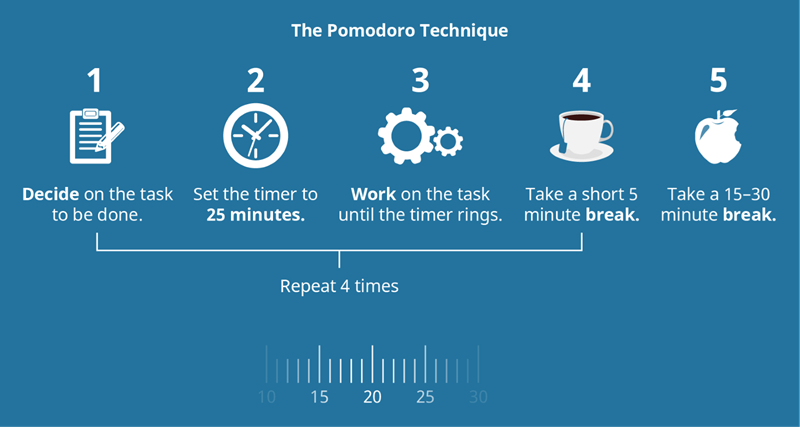4.2 Procrastination
Questions to consider:
- Why do we procrastinate?
- What are the effects of procrastination?
- How can we avoid procrastination?
- What strategy helps me prioritize my top tasks?
A very unfortunate but all-too-common situation in higher education is the danger students face from poor time management. Many college administrators who work directly with students are aware that a single mishap or a case of poor time management can set into motion a series of events that can seriously jeopardize a student’s success. In some of the more extreme instances, the student may even fail to graduate because of it.
To better understand how one instance of poor time management can trigger a cascading situation with disastrous results, imagine that a student has an assignment due in a business class. She knows that she should be working on it, but she is not in the mood. Instead, she convinces herself that she should think a little more about what she needs to complete the assignment and decides to do so while looking at social media or playing a couple more rounds of a game on her phone. In a little while, she suddenly realizes that she has become distracted, and the evening has slipped away. She has little time left to work on her assignment. She stays up later than usual trying to complete the assignment but cannot finish it. Exhausted, she decides that she will work on it in the morning during the hour she had planned to study for her math quiz. She knows there will not be enough time in the morning to do a decent job on the assignment, so she decides she will put together what she has and hopes she will at least receive a passing grade.
At this point in our story, an evening of procrastination has not only resulted in a poorly done business class assignment, but now she is going to take a math quiz that she has not studied for. She will take the quiz tired from staying up too late the night before. Her lack of time management has now raised potential issues in two courses. She will now have to work harder on both courses to improve her grades. Any other problems she has with future assignments in either course could cause a domino effect of circumstances that begin to overwhelm her.
In our imagined situation, you can see how events set into motion by a little procrastination can quickly spiral out of control. You can think of similar experiences in your own life, when one small bit of poor time management set off a chain of events that threatened to cause big problems.
The High Cost of Procrastination
It is not just your academic performance that can be affected by cascading events that have a domino effect on your college path. Dropping out of school is not your only danger. There are other consequences that affect the financial cost to you as a student if your lack of time management skills causes you to delay finishing college.
Based on independent research, a Washington Post article, “Spending a Few Extra Years in College May Cost You More Than You Think ,” details the monetary impact delaying graduation by two semesters can have on a student. According to the article, there is a significant cost associated with delaying graduation from college by only one year (by dropping and retaking courses, taking less than a full credit load, etc.). Not only will you pay for additional tuition, textbooks, and other fees, if you are using student loans, you will also accumulate interest on those loans. On average this would come to an extra $12,557 in actual costs and $6,040 in interest at a public university, or $18,992 in tuition and fees and $7,823 in interest (over 10 years) at a private school. That is a lot of extra cost to you!
While a loss of $26,815 may seem like a lot of money, it pales in comparison to the other financial areas impacted by a single extra year in school. The Washington Post article estimates that a year delay of graduation would cost you an additional $46,355 based on average lost earnings. To make matters worse, like the story of the student who procrastinates finishing her business assignment, there is a spiraling effect that takes place with loss of income when it comes to retirement investments. The figure cited by the Washington Post as lost retirement earnings for taking five years instead of four years to graduate is $82,074. That brings the average total cost for only two extra semesters to almost $150,000. Measured by the financial cost to you, even a slight delay in graduation can have a serious impact.
Average Cost of an Additional Year of a 4-Year Public College
| Tuition, textbooks, and fees | $12,557 |
|---|---|
| Interest on student loans | $6,040 |
| Lost wages | $46,355 |
| Lost retirement earnings | $82,074 |
| Average total loss: | $147,026 |
Any situation that brings about a graduation delay can increase the cost of college. This also includes attending school part-time. While in some instances responsibilities may make it impossible to go to school full-time, from a financial perspective you should do all you can to graduate as soon as you can. While it may not be possible to prevent life challenges while you are in college, you can do a great deal to prevent the chaos and the chain reaction of unfortunate events that they can cause. This can be accomplished through thoughtful prioritization and time management efforts.
What follows in the rest of this chapter is a close look at the nature of time management and prioritization in ways that can help keep you on track to graduate college on time.
The Reasons Behind Procrastination
There are several reasons we procrastinate, and a few of them may be surprising. On the surface, we often tell ourselves it is because the task is something we do not want to do, or we make excuses that there are other more important things to do first. In some cases, this may be true, but there can be other contributors to procrastination that have their roots in our physical well-being or our own psychological motivations.
Lack of Energy
Sometimes we just do not feel up to a certain task. It might be due to discomfort, an illness, or just a lack of energy. If this is the case, it is important to identify the cause and remedy the situation. It could be something as simple as a lack of sleep or improper diet. Regardless, if a lack of energy is continually causing you to procrastinate to the point where you are starting to feel stress over not getting things done, you should assess the situation and address it.
Lack of Focus
Much like having low physical energy, a lack of mental focus can be a cause of procrastination. This can be due to mental fatigue, being disorganized, or allowing yourself to be distracted by other things. Again, like low physical energy, this is something that may have further-reaching effects in your life that go beyond the act of simply avoiding a task. If it is something that is recurring, you should accurately assess the situation.
Fear of Failure
This cause of procrastination is not one that many people are aware of, especially if they are the person avoiding tasks because of it. To put it in simple words, it is a bit of trickery we play on ourselves by avoiding a situation that makes us psychologically uncomfortable. Even though they may not be consciously aware of it, the person facing the task is afraid that they cannot do it or will not be able to do it well. If they fail at the task, it will make them appear incompetent to others or even to themselves. Where the self-trickery comes in is by avoiding the task. In the person’s mind, they can rationalize that the reason they failed at the task was because they ran out of time to complete it, not that they were incapable of doing it in the first place.
It is important to note that a fear of failure may not have anything to do with the actual ability of the person suffering from it. They could be quite capable of doing the task and performing well, but it is the fear that holds them back.
Social-Cultural Challenges
Many college students are pulled in a variety of directions because of family demands and money challenges. First-generation college students often have various obstacles as they navigate college without help or support of family. Having to learn how and where to access help can be an obstacle to successfully battling procrastination.
 Analysis Question
Analysis Question
Consider something right now that you may be procrastinating about. Are you able to identify the cause?
The Effects of Procrastination
The loss of time as an effect of procrastination is the easiest to identify since the act of avoiding a task comes down to not using time wisely. Procrastination can be thought of as using the time you have to complete a task in ways that do not accomplish what needs to be done.
Loss of Time
The loss of time as a result of procrastination is the easiest to identify since the act of avoiding a task comes down to not using time wisely. Procrastination can be thought of as using the time you have to complete a task in ways that do not accomplish what needs to be done.
Loss of Goals
Another of the more obvious, potentially adverse, effects of procrastination is the loss of goals. Completing a task leads to achieving a goal. These can be small or large (e.g., from doing well on an assignment to being hired for an excellent job). Without goals, you might do more than delay work on a task—you may not complete it at all. The risk of the loss of goals is very impactful.
Loss of Self-Esteem
Often, when we procrastinate, we become frustrated and disappointed in ourselves for not getting important tasks completed. If this continues to happen, we can begin to develop a low opinion of ourselves and our own abilities. We begin to suffer from low self-esteem and might even begin to feel like there is something wrong with us. This can lead to other increasingly negative mental factors such as anger and depression. As you can see, it is important for our own well-being to avoid this kind of procrastination effect.
Stress
Procrastination causes stress and anxiety, which may seem odd since the act of procrastination is often about avoiding a task. Anyone who has noticed that nagging feeling when they know there is something they should be doing is familiar with this.
On the other hand, some students see that kind of stress as a boost of mental urgency. They put off a task until they feel that surge of motivation. While this may have worked in the past, they quickly learn that procrastinating when it comes to college work includes an underestimation of the tasks to be completed— sometimes with disastrous results.
Managing Procrastination
Now that you understand a few of the major problems procrastination can produce, let us look at methods to manage procrastination and get you on to completing the tasks, no matter how unpleasant you think they might be.
Get Organized
Much of this chapter is dedicated to defining and explaining the nature of time management. The most effective way to combat procrastination is to use time and project management strategies such as schedules, goal setting, and other techniques to get tasks accomplished on time.
Put Aside Distractions
Several of the methods discussed in this chapter deal specifically with distractions. Distractions are time-killers and are the primary way people procrastinate. It is easy to just play a video game a little while longer, check out social media, or finish watching a movie when we are avoiding a task. Putting aside distractions is one of the primary functions of setting priorities.
Reward Yourself
Rewarding yourself for the completion of tasks or meeting goals is an effective way to avoid procrastination. An example of this would be rewarding yourself with the time to watch a movie you would enjoy after you have finished the things you need to do, rather than using the movie to keep yourself from getting things done.
Be Accountable—Tell Someone Else
A strong motivational tool is to hold ourselves accountable by telling someone else we are going to do something and when we are going to do it. This may not seem like it would be highly effective, but on a psychological level we feel more compelled to do something if we tell someone else. It may be related to our need for approval from others, or it might just serve to set a level of commitment. Either way, it can help us stay on task and avoid procrastination—especially if we take our accountability to another person seriously enough to warrant contacting that person and apologizing for not doing what we said we were going to do.
Breaking Down the Steps and Spreading Them over Shorter Work Periods
The concept behind this strategy is to break tasks into smaller, more manageable units that do not require as much time to complete. As an illustration of how this might work, imagine you are assigned a two-page paper to include references. You estimate that to complete the paper—start to finish—would take you between four and a half and five hours. You look at your calendar for the next week and see that there simply are no open five-hour blocks (unless you decided to only get three hours of sleep one night). Rightly so, you decide that going without sleep is not a good option. While looking at your calendar, you do see that you can squeeze in an hour or so every night.
More Strategies that Work
 |
Daily Top Three
The idea behind the daily top three approach is to determine which three things are the most important to finish that day, and these become the tasks that you complete. It is an amazingly simple technique that is effective because each day you are finishing tasks and removing them from your list. Even if you took one day off a week and completed no tasks on that day, a daily top three strategy would have you finishing 18 tasks in a single week. That is a sizable number of things crossed off your list. |
|---|---|
 |
Pomodoro Technique
The Pomodoro Technique is named after a type of kitchen timer, but you can use any clock or countdown timer. This technique was developed by Francesco Cirillo. The basic concept is to use a timer to set work intervals followed by a short break. The intervals are usually about 25 minutes long and are called Pomodoros, which comes from the Italian word for tomato because Cirillo used a tomato-shaped kitchen timer to keep track of the intervals. In the original technique there are six steps:
There are several reasons this technique is deemed effective for many people. One is the benefit that is derived from quick cycles of work and short breaks. This helps reduce mental fatigue and the lack of productivity caused by it. Another is that it tends to encourage practitioners to break tasks down to things that can be completed in about 25 minutes, which is something that is usually manageable from the perspective of time available. It is much easier to squeeze in three 25-minute sessions of work during the day than it is to set aside a 75- minute block of time. |
 |
Eat the Frog
Of our three quick strategies, eat the frog has the strangest name and may not sound the most inviting. The name comes from a famous quote, attributed to Mark Twain: “Eat a live frog first thing in the morning and nothing worse will happen to you the rest of the day.” Eat the Frog is also the title of a best-selling book by Brian Tracy that deals with time management and avoiding procrastination. How this applies to time and task management is based on the concept that if a person takes care of the biggest or most unpleasant task first, everything else will be easier after that. Although stated in a humorous way, there is a good deal of truth in this. First, we underestimate how much worry can impact our performance. If you are continually distracted by anxiety over a task you are dreading, it can affect the task you are working on at the time. Second, not only will you have a sense of accomplishment and relief when the task you are concerned with is finished and out of the way, but other tasks will seem lighter and not as difficult. |
Activity 4.1
Try Three Time Management Strategies
Over the next two weeks, try each of the three methods described above to see which ones might work for you. Is there one you favor over the others? Might each of these three approaches serve you better in different situations or with different tasks? Do you have a creative alternative or a way to use some combination of these techniques? The key is to find which system works best for you.
Quick Quiz 4.2
- Why is delaying graduation expensive?
- What are the reasons people procrastinate?
- What are three strategies to manage procrastination?
Licenses and Attribution
CC Licensed Content
- College Success by Amy Baldwin is licensed CC BY. Access for free.
References
- Douglas-Gabriel, D. (2016, June 21). Spending a few extra years in college may cost you more than you think. The Washington Post. https://www.washingtonpost.com/news/grade-point/wp/2016/06/21/spending-a-few-extra-years-in-college-may-cost-you-more-than-you-think/
- Verch, M. (2018). Pomodoro Technique [Photograph]. Flickr. CC BY 2.0
- Verch, M. (n.d.). [Photograph of a tomato-shaped oven timer] [Photograph]. Flickr.
Images or Graphic Elements
- Images used by permission from Alamo Colleges District Department of Communications.


